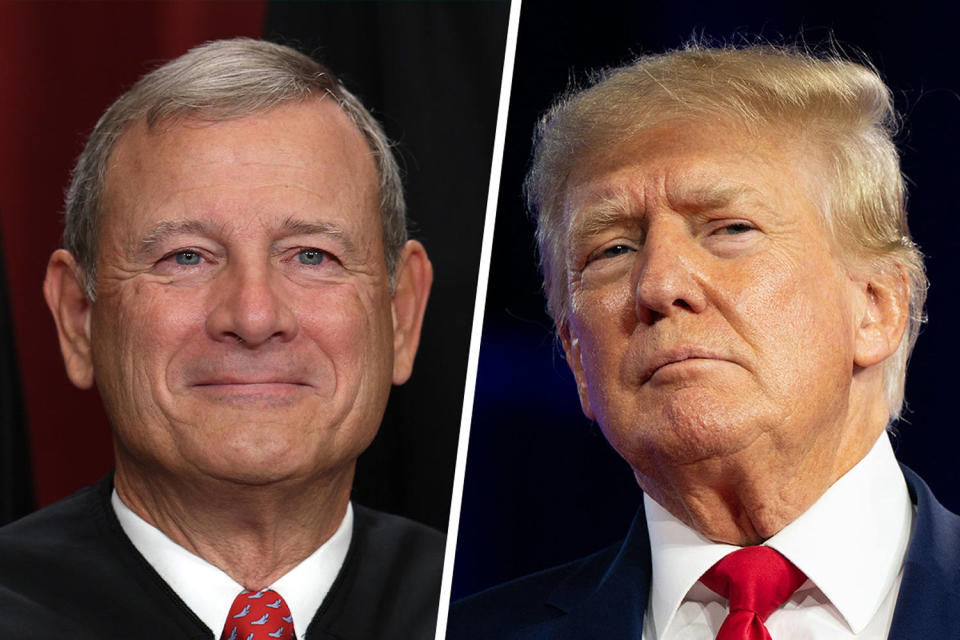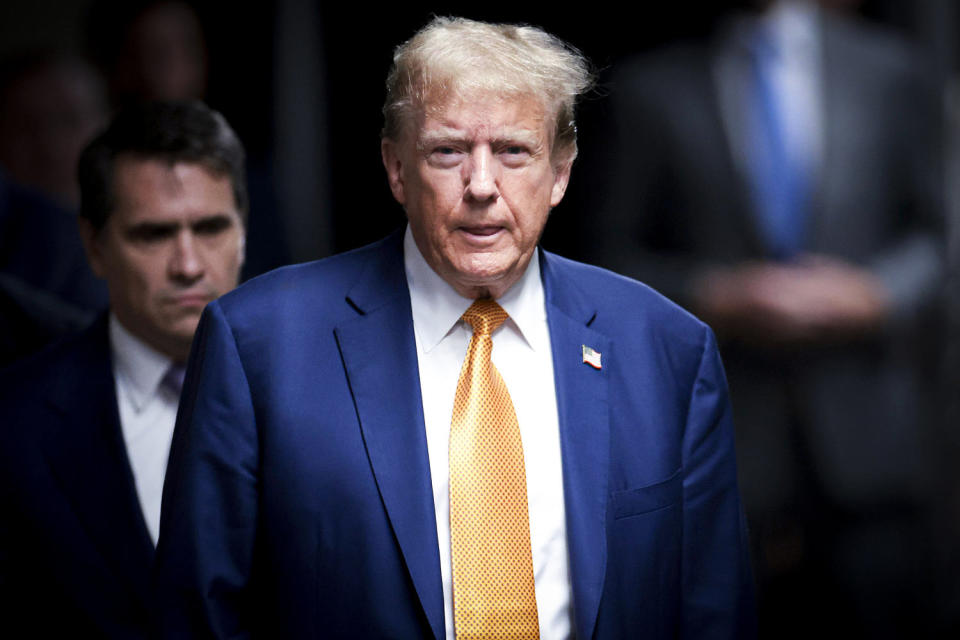Opinion | Supreme Court delay on Trump’s immunity claim gets more outrageous by the day
- Oops!Something went wrong.Please try again later.
- Oops!Something went wrong.Please try again later.
- Oops!Something went wrong.Please try again later.
- Oops!Something went wrong.Please try again later.
This week brought milestones, good and bad, in two of the criminal cases against Donald Trump. The positive one came in his prosecution in New York City for allegedly falsifying business records to cover up interference in the 2016 election. There, prosecutors rested their case on Monday, having put on a powerful case in the view of many — including one of the authors (Eisen), who has been present daily in court. On Tuesday, the defense rested, as well, and Judge Juan Merchan told the jury to expect summations and deliberation next week.
The negative milestone came in Washington, regarding the federal prosecution of Trump in the District of Columbia for allegedly interfering in the 2020 election. On Monday, the Supreme Court blew past a critical date, by which precedent teaches the dispute over Trump’s claim of presidential immunity should have been decided. However the New York case turns out, its rapid movement should serve as a rebuke to the ethically conflicted Supreme Court justices who are obviously and unduly stalling the Washington case.
The truth is we should have already had or been close to a verdict in the federal prosecution brought by special counsel Jack Smith. That case concerns the conspiracy Trump allegedly orchestrated to manipulate the results of the 2020 presidential election, which culminated in the Jan. 6 insurrection. The Washington case had been set to begin in early March, and Manhattan DA Alvin Bragg had expressed openness to postponing the New York case so the Washington one could go first. With the federal trial estimated to last eight to 12 weeks, it would most likely be done or wrapping up by now.
The reason that didn’t happen is that a majority on the court decided to delay the administration of justice by considering Trump’s outrageous presidential immunity argument. Trump argues that because he was president at the time of the alleged crimes, he is immune from prosecution in the case. But he doesn’t stop there: His lawyers have presented a shocking theory of presidential power that would render him immune even if he ordered SEAL Team Six to assassinate his political rivals (barring first being impeached and convicted, something that has never happened in American history).
Agreeing to address this absurd claim was legally unnecessary. A three-judge panel of the U.S. Circuit Court of Appeals for Washington, D.C., unanimously rejected it. The justices surely know a president doesn’t get a free pass on every crime. In all likelihood, the justices will reject Trump’s position and perhaps set out a narrower view of presidential immunity.
What’s even more unbelievable is that the Supreme Court had the chance to consider the issue in December — as Smith requested — but chose not to. It decided to take up the case only in late February, then scheduled the hearing for April 25, the very last day of arguments this term. And now, it is dragging out deciding the case.
In Trump v. Anderson, the case deciding whether Trump could remain on Colorado’s ballot as a presidential candidate despite the constitutional limits on insurrectionists’ holding office, the Supreme Court ruled in Trump’s favor just 25 days after oral arguments and just 61 days after he petitioned the court for review. It did so even though Trump remained on the ballot pending a decision. Tuesday marked 26 days after the court heard oral arguments, 99 days and counting since he appealed the unanimous D.C. Circuit ruling against him and 162 days and counting since the Justice Department originally asked it to take up the case. Yet there is no sign of a decision.
Moreover, recent revelations affirm that there are deep biases among the nakedly pro-Trump justices of this court and that Chief Justice John Roberts knew that when the court took the case. Justices Clarence Thomas and Samuel Alito should have been recused under any standard of judicial ethics. We already knew that Thomas’ wife, Ginni, was entangled in the run-up to Jan. 6 and was a witness in the congressional investigation of the insurrection. Last Thursday, the shocking news broke that an upside-down flag, a symbol of the “Stop the Steal” conspiracy, flew at Alito’s house shortly after the Jan. 6 insurrection. “Word of the flag filtered back to the court,” reported The New York Times, and yet the incident was hidden from the public for years.
Had Alito and Thomas been recused, it would have required the votes of the four other Republican-appointed justices, including Roberts, to take the case. At a minimum, given Roberts’ repeated statements of concern for the credibility of the court, he owes the public a transparent accounting of how Alito and Thomas can be allowed to continue to sit on this case. The public is due similar explanations for their participation in the court’s decision to hear Fischer v. U.S., which challenges convictions of insurrectionists under the obstruction-of-an-official-proceeding statute also at issue in the Trump prosecution.
The participation of Thomas and Alito and the failure to explain it is another piece of evidence that this Supreme Court isn’t actually concerned with justice. The court shouldn’t have interfered with Smith’s effort to push a trial forward, and quickly. Americans deserve to know whether someone running in this election is guilty of a criminal conspiracy to overthrow the last one. Even to a body so clearly compromised, this is surely obvious. The Supreme Court has ruled with extraordinary speed in critical cases before — the Pentagon Papers to Watergate to Bush v. Gore. The court could have chosen to do the same here. It failed to.
Meanwhile, in the New York trial, the prosecution seems on track for a conviction, which would be the first major blow to Trump’s autocratic strategy of election shenanigans. Trump’s enablers understand that, which is why a crowd of members of Congress and state elected officials showed up last week in front of microphones at the courthouse — and why there was deafening silence from the Supreme Court, which has still failed to issue an immunity ruling.
If the pro-Trump justices on the court cared as much about an insurrection as they do about shielding the former president, we would already have had a verdict in a trial regarding Trump’s alleged role in the Jan. 6 insurrection. The fact that we don’t is damning, if not surprising, evidence of those justices’ real priority: protecting Donald Trump.
This has gone much too far already. Each day without a ruling on immunity from the Supreme Court is an intentional delay that most likely ensures Trump won’t be held accountable for his alleged attempts to steal the last election ahead of the next one. Chief Justice Roberts must demand that Justices Thomas and Alito not be allowed to participate in deciding the immunity case or any other decision related to Jan. 6. And the Senate should hold hearings immediately investigating their conduct. Any other course risks the court’s legitimacy, Americans’ rights and the rule of law.
This article was originally published on MSNBC.com


